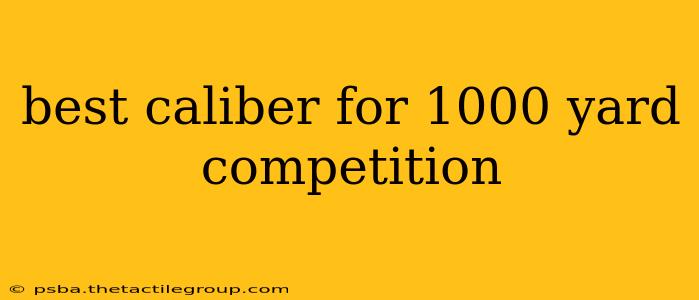Shooting at 1000 yards demands precision, power, and a deep understanding of ballistics. Choosing the right caliber is paramount to success in this challenging discipline. This isn't just about picking the biggest round; it's about finding the optimal balance of factors including bullet performance, wind drift, recoil management, and overall cost-effectiveness. This comprehensive guide will delve into the top contenders, helping you make an informed decision for your 1000-yard competition endeavors.
Factors Influencing Caliber Selection
Before we dive into specific calibers, let's examine the key factors that influence the choice:
1. Ballistic Coefficient (BC):
The BC measures a projectile's ability to overcome air resistance. A higher BC means less wind drift and a flatter trajectory at long range, crucial for 1000-yard accuracy.
2. Bullet Construction:
Modern bullets utilize various designs, such as MatchKing, Berger, and Lapua Scenar, each optimized for specific performance characteristics at extreme distances. Construction features like the jacket material, core composition, and boat-tail design significantly affect accuracy and stability.
3. Cartridge Case Capacity:
Case capacity dictates the amount of propellant that can be used, influencing velocity and subsequently, range and accuracy. Larger cases generally handle more powder, allowing for higher velocities but potentially increasing recoil.
4. Recoil Management:
Shooting at 1000 yards involves many shots, and managing recoil is essential for consistent accuracy. Heavier rifles and calibers with lower recoil are preferred for maintaining stability and shooter comfort.
5. Cost:
Ammunition, particularly for long-range shooting, can be expensive. Considering the cost per round and overall expenses is vital for long-term participation in 1000-yard competition.
Top Caliber Contenders for 1000 Yards
Several calibers consistently prove their worth in 1000-yard competitions. Here's a closer look at some of the most popular choices:
6mm Creedmoor:
- Pros: Excellent balance of accuracy, manageable recoil, relatively low cost per round. Offers exceptional ballistic coefficient bullets.
- Cons: Might be slightly underpowered compared to larger calibers in extremely challenging wind conditions.
6.5 Creedmoor:
- Pros: Superb accuracy and relatively low recoil, a popular choice among long-range shooters. Excellent BC bullets are readily available.
- Cons: Can be slightly more expensive than 6mm Creedmoor.
6.5 PRC (Precision Rifle Cartridge):
- Pros: High ballistic coefficient bullets, very flat trajectory, increased downrange energy compared to 6.5 Creedmoor.
- Cons: More recoil than the Creedmoor calibers, potentially increasing shooter fatigue. Ammunition can be more expensive.
.300 Winchester Magnum:
- Pros: Powerful cartridge offering exceptional range and energy. Provides excellent penetration at long ranges.
- Cons: Significant recoil makes it challenging for less experienced shooters. Ammunition cost is considerably higher.
.338 Lapua Magnum:
- Pros: Exceptional range and energy, superior to the other calibers in very extreme wind conditions. High BC bullets are available.
- Cons: Extremely high recoil demands significant physical strength and experience. Significantly more expensive than other options.
Choosing the Right Caliber for You
The "best" caliber is subjective and depends on individual factors. Consider your:
- Shooting experience: Beginners should start with lower recoil calibers like 6mm or 6.5 Creedmoor.
- Physical capabilities: Manage recoil and fatigue; if you lack strength or experience, larger calibers are not recommended.
- Budget: Ammunition cost varies significantly across calibers.
- Competition rules: Some competitions might have restrictions on caliber choices.
Ultimately, the best way to determine the best caliber for your 1000-yard competition is through personal testing and experience. Consider renting or borrowing rifles in different calibers before making a significant investment. Consistent practice, proper technique, and the right equipment are crucial to success at this challenging distance.

